Review: Trio. For the beauty of it
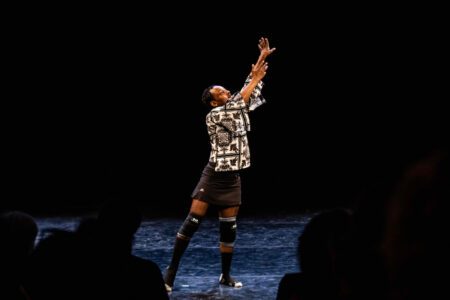
| Location | Goose on a String Theatre / Provazek hall in Brno, Czech Republic |
| Date of Performance | May 23, 2024 |
| Language(s) | English, French, and Spanish |
| Photos by Ivo Dvořák | Alex Mugler |
Reviewed by Amanda L. Andrei
Poisson. Head bob. Poisson. Head bob. Je suis. Hand-chest. Je suis. Hand-chest.
In a simple rhythm, a pair of dancers build gestural language: one speaks into a microphone far downstage, almost in the audience, and the other waits in the center, associating a body motion with the spoken word. As “poisson” (French for “fish”) becomes a dip of the head, other words in French and English follow suit throughout Trio. For the beauty of it. The three dancers of the transnational company La Fleur use spoken language only to transcend speech, all while deftly unveiling their creative process to the audience and celebrating their heritage dance styles.
Director Monika Gintersdorfer and choreographer Franck Edmond Yao, both co-founders of La Fleur, conjure an ingenious space for each dancer to shine individually as well as an ensemble.
The Ivorian choreographer and dancer Ordinateur rises first with coupé-décalé, a style of dance and music originating from the Ivorian diaspora in Paris in the early 2000s. He vibrates with atomic essence, the repetition and speed of his steps so simple and precise that the effect is trancelike. Speaking in French, the dancer also tells us that in Côte d’Ivoire, the slang for this dance is “roukasskass,” a word both crunchy and sibilant that feels in line with the swift drumbeats and Ordinateur’s footsteps.
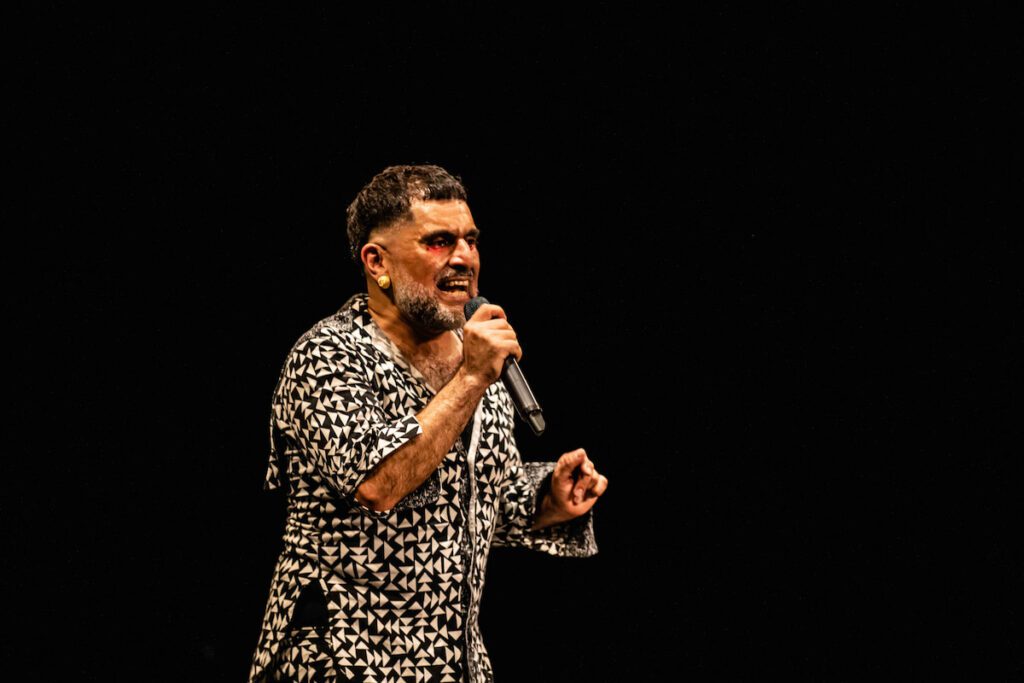
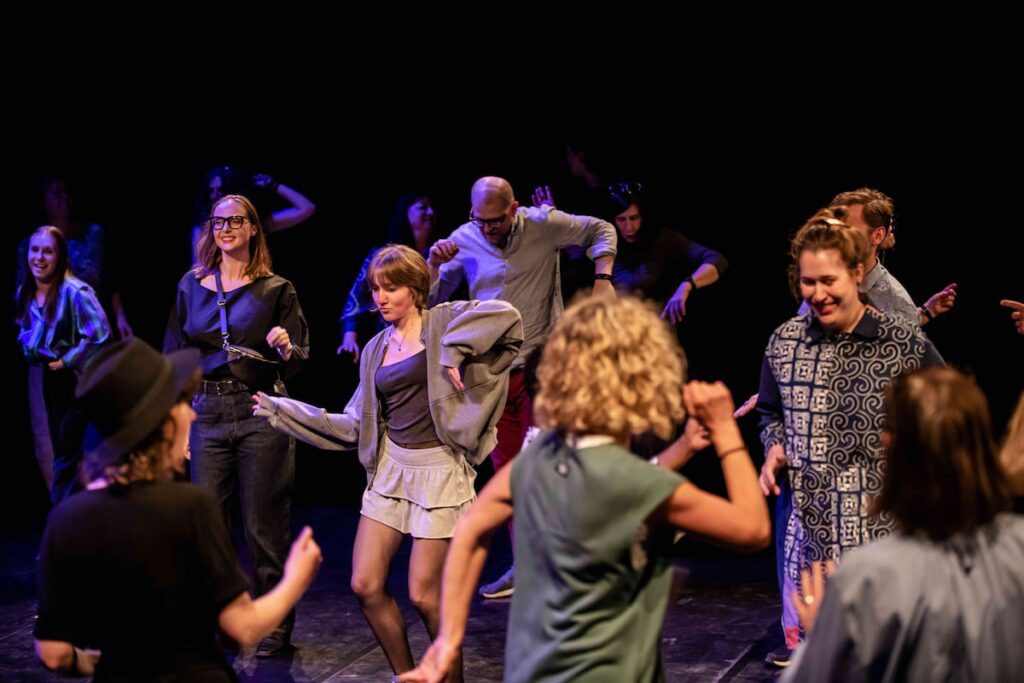
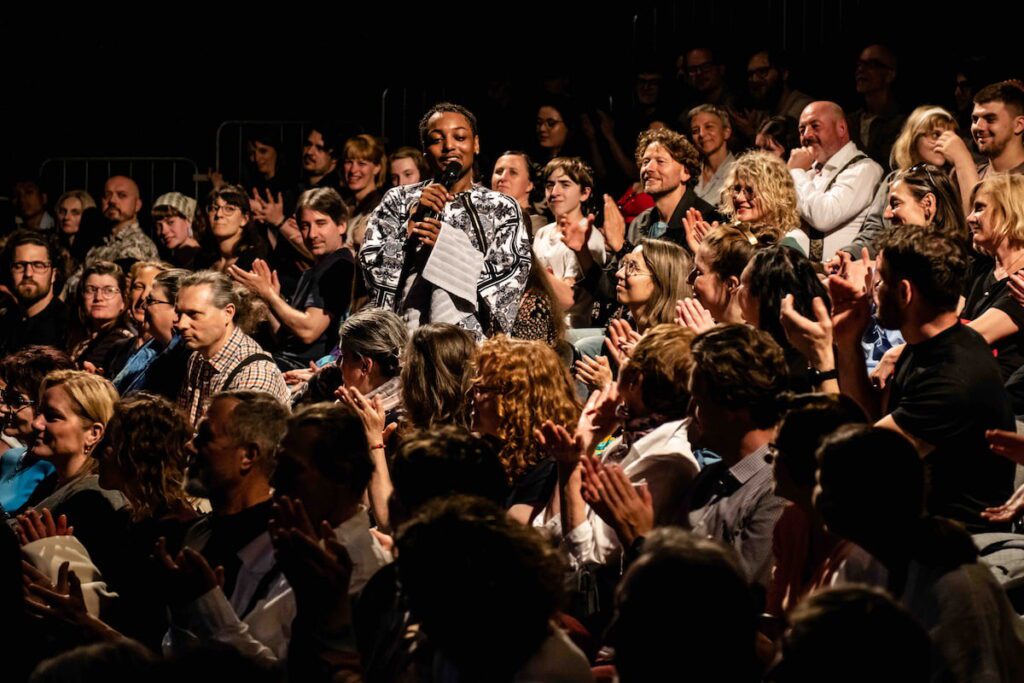
Carlos Gabriel Martínez Veláquez shakes us into cumbia sonidera, a Mexican subgenre of cumbia, a DJ-influenced music and dance style with roots in Latin American and African traditions. To the sounds of salsa guitar licks with an electronica touch, Veláquez spins and quakes with abandon, drawing in the other dancers.
Switching between English and Spanish, the dancer also generously shares meanings of the symbols behind his cultural and artistic influences. Most striking is the idea of the snake, which he tells the audience, “The snake helps us do the right thing in the right moment in the right mode.” In the midst of such festivities, it’s a beautiful reflective moment of how a dancer intuits their next move, how the animal and the divine are present as a source of grace, awareness, and eroticism.
Repping the New York vogue and ballroom scene, Alex Mugler shares with us the dance style developed by queer black and Latine folks of color from the 1960s and onwards in Harlem. With confidence and poise, Mugler’s hands and arms swoop, dive, and flourish before he leaps to the floor, nimbly twisting and posing to loud cheers.
His performance of a song about “kiki”—a slang term from ballroom culture that can refer to the giddiness of a friends’ gossip circle—provides a ticklish moment with a deeper meaning. As the three dancers weave in and out of each other’s space, reciting opposites such as “up, down, right, left,” Mugler sings variations of “let’s have a kiki.” It’s as breezy and fun as spilling tea tends to be, but it also serves as a subtle approach to breaking binaries: we can interrupt our notions of dualism and black-and-white thinking with the frivolity and mercurialness, letting us view the world with more fun and ease.
Towards the end of the hour, Mugler leads Ordinateur and Veláquez in a ballroom dance-off, telling us that we get to judge their skills. It’s another act of generosity to invite us into this world, and we roar with praise for the dancers—who then invite us onstage to romp and whirl with them. And when dancers this skillful encourage you to play and move with them, there’s no hesitation. You dance for the beauty of it.
More information about the Theatre World Brno 2024 Festival (May 17-28) is available here.
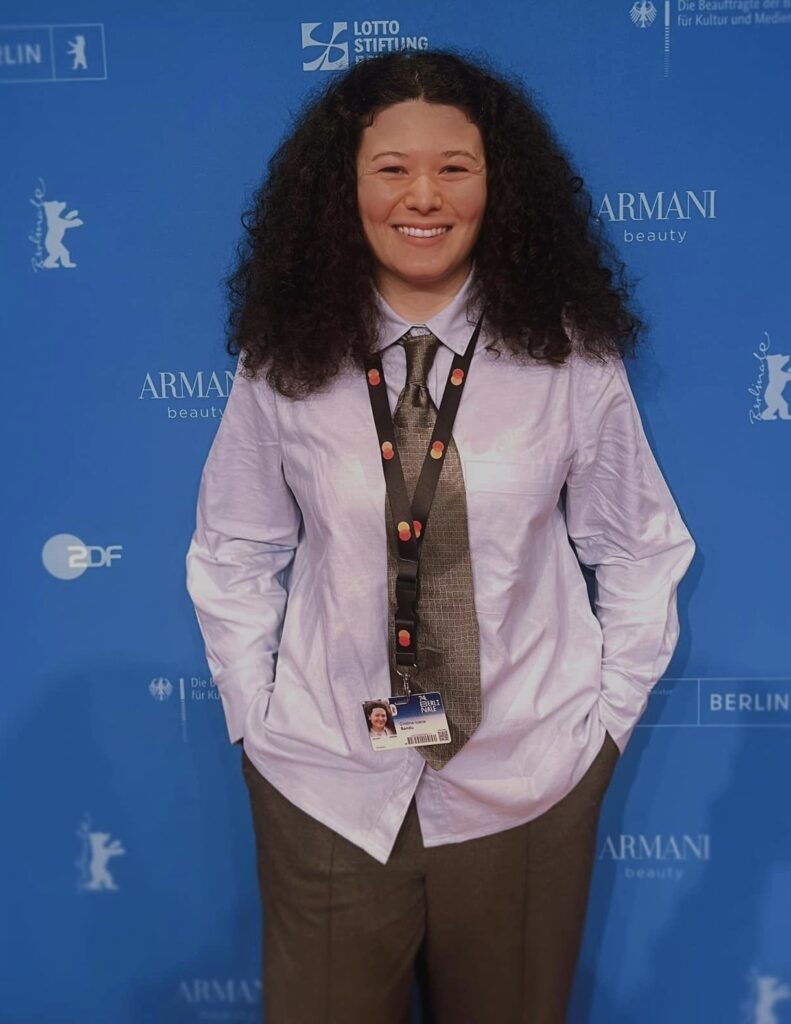
Cristina Sandu Bio: Journalist Cristina-Ioana Sandu graduated from De Montfort University in the UK and is passionate about photography, cinema, music, and storytelling. With a background rooted in journalism and media, Cristina brings a vibrant perspective to her work, shaped by hands-on experience in the film industry and live event production.
Her journey also includes crafting compelling narratives that explore identity, art, and human connection. Her blog acts as a personal and creative space to document life, celebrate authenticity, and highlight significant voices in arts and culture. Discover more at: www.cristinaioanasandu.com
SUPPORT SEEFEST
Not a member yet? Become an art patron with other SEEfest arthouse aficionados in support of great events and programs. Our mission is to keep you informed about initiatives from our wide network of fellow cultural organizations.
We Welcome YOU!
Review: The Ratcatcher
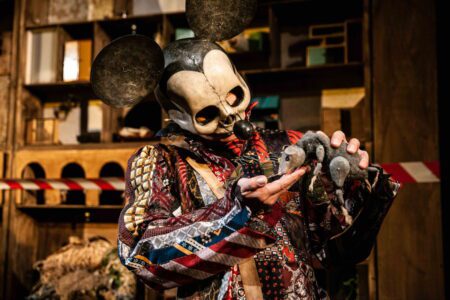
| Location | Radost Theatre in Brno, Czech Republic |
| Date of Performance | May 22, 2024 |
| Language | Czech with English language surtitles |
| Photo by Jakub Jíra | Jiří Skovajsa as Pied Piper. |
Reviewed by Amanda L. Andrei
Once upon a time, there was a small German town named Hamelin. When it became plagued by rats, the mayor sought to eliminate the pests, using cats, traps, and poison. Naturally, when these methods didn’t work, he called in the heavyweight hotshot: a skull-faced Mickey Mouse toting an empty sack and playing a mean recorder.
That’s The Ratcatcher, a clever and intricate adaptation of the Pied Piper fairytale for ages 12 and up, produced by Divadlo Radost in cooperation with the French puppet company, Les Antliaclastes. Performed at the Theatre World Brno Festival, the story expands upon the original folktale with kooky, lush detail and a modern twist.
Early on, the rats emerge from a massive dollhouse-like structure that doubles as the Hamelin neighborhood (designed by Patrick Sims, also director and puppeteer). Each compartment resembles a shadow box: some with miniature furniture, some with musical instruments, some simply plain with wallpaper or a human doll. There’s even a toilet with a cross-section of piping running down the side. The set’s playfulness contrasts against the sinister nature of a huge disease-ridden flea (played by Radim Sasínek) and the crafty mayor (Václav Vítek), each donning superb masks designed by Josephine Biereye.
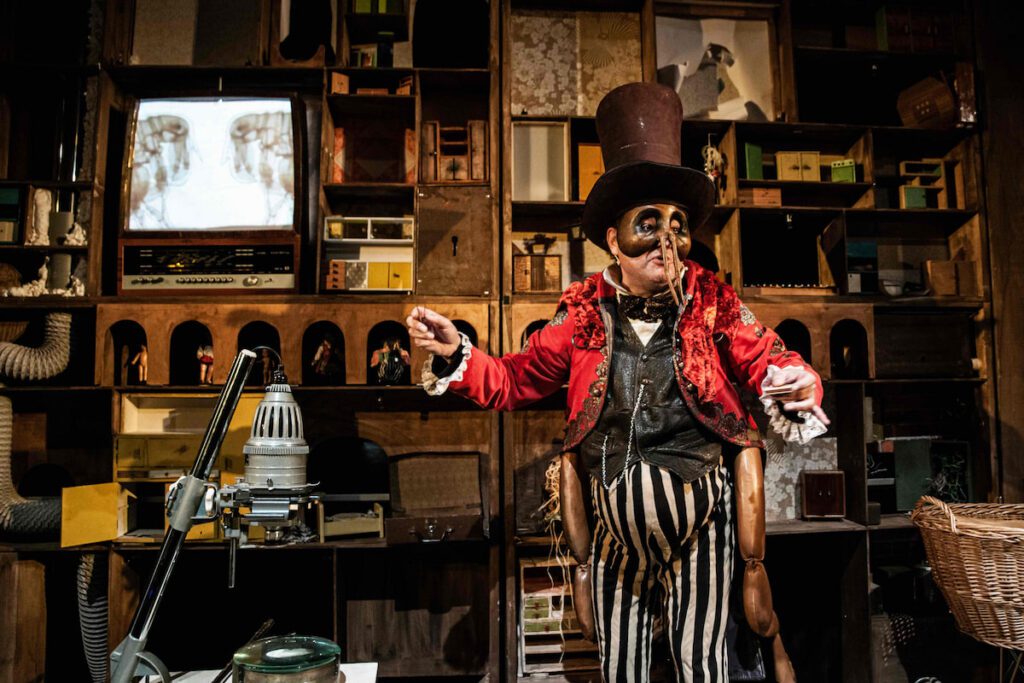
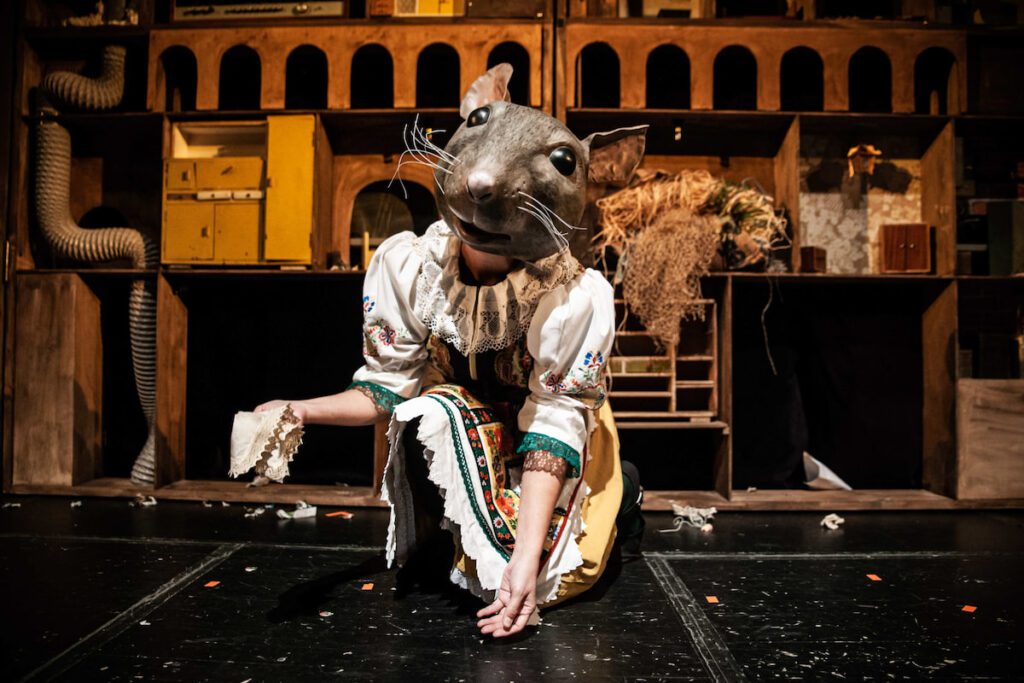
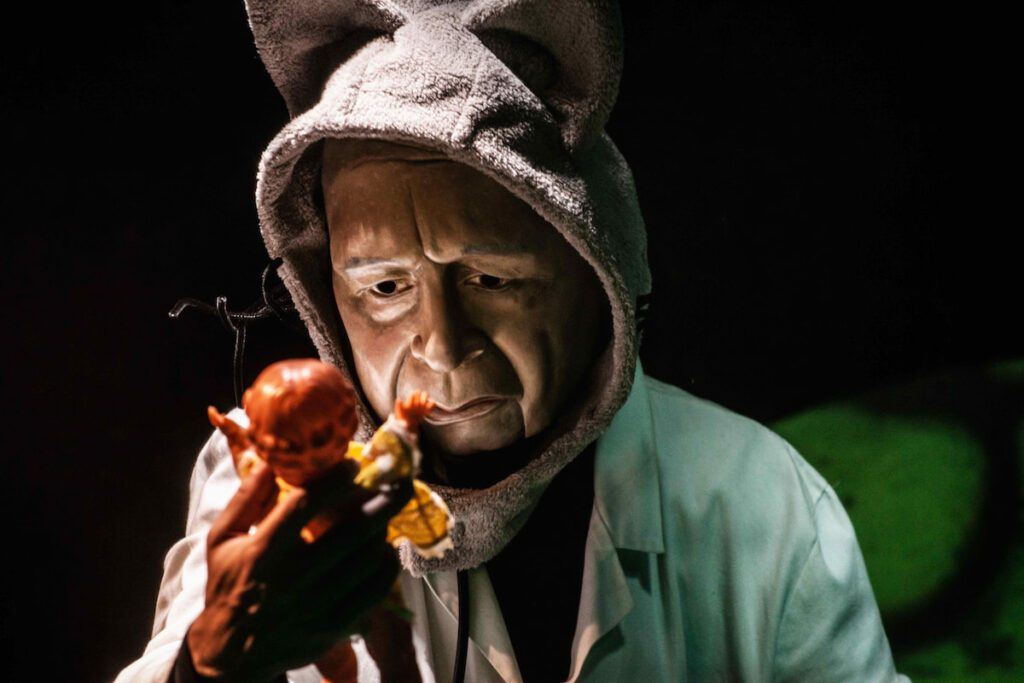
But their sinister nature pales in comparison to the creepiness of the pied piper (Jiří Skovajsa), emanating cutthroat business ideals and greed. In the guise of the notorious Mouse and the specter of Death, he wears a jingling coat of suit ties and seduces the rats (and later, the children) with his music until they plop into his cloth sack and the musical mercenary hopes coins will fill his hand. On their way to death? As a modern fairytale crustacean would croon, “They in for a worser fate.”
As the friendly Rat Girl (Stanislava Havelková) cracks open the house-town with a wooden spoon, the German legend catapults into the satirical sci-fi world of Hamelin Laboratories, where the traitorous mayor—now referred to as Research Director—conducts bizarre experiments on rats and humans.
The exaggerated nature of the puppets (including a robotic feline and a chatty cheese wedge) keep the circumstances comic and cartoonish. Whereas older endings of the narrative focused on disability, death, or despair, Les Antliaclastes and Divadlo Radost take anxieties about the future and present them in a style that is refreshingly weird, thanks to its mashup of fairytale and mad science gone corporate.
There are a few opportunities for growth in the show. For instance, the bit of one rat turning rockstar is so amusing that it deserves an encore. And when the masked Rat Girl plays with unclothed baby dolls from a carriage, it’s unclear if they’re meant to represent living children or everyday toys, making it difficult to establish a sense of attachment for the figurines or their connections to the kidnapped children. These are minor details in an otherwise sensory-rich production and one aimed at adolescents.
The concept could go the direction of George Orwell’s Animal Farm if the company so desired, transforming into a sharp fable about current economic and social conditions. But with a traditional tale already so piercingly macabre, and a Hamelin house-town-lab so lavishly constructed, sharp edges aren’t necessary to enhance the show’s quaint delight. Skeleton Mickey is plenty.
More information about the Theatre World Brno 2024 Festival (May 17-28) is available here.

Cristina Sandu Bio: Journalist Cristina-Ioana Sandu graduated from De Montfort University in the UK and is passionate about photography, cinema, music, and storytelling. With a background rooted in journalism and media, Cristina brings a vibrant perspective to her work, shaped by hands-on experience in the film industry and live event production.
Her journey also includes crafting compelling narratives that explore identity, art, and human connection. Her blog acts as a personal and creative space to document life, celebrate authenticity, and highlight significant voices in arts and culture. Discover more at: www.cristinaioanasandu.com
SUPPORT SEEFEST
Not a member yet? Become an art patron with other SEEfest arthouse aficionados in support of great events and programs. Our mission is to keep you informed about initiatives from our wide network of fellow cultural organizations.
We Welcome YOU!
The Constitution Opens the 12th Annual SEEfest on April 27
Nebojša Glogovac. Photo by Hà Kin
The Constitution by Croatian director Rajko Grlic is the Opening night film of the 12th edition of SEEfest on Thursday, April 27 at the Writers Guild Theater in Beverly Hills, at 7:00 PM.
Winner of the Grand Prize of the Americas at the Montreal World Film Festival, and Best International Feature Film Award of the Santa Barbara Film Festival 2017, among other awards, The Constitution has enjoyed critical and commercial success wherever it was shown.
Tickets are now available for SEEfest Opening gala and screening of The Constitution.
April 27 at the Writers Guild Theater
135 South Doheny Drive, Beverly HIlls
Doors open at 6:00 pm
Film screens at 7:00 pm
Reception immediately following the film
Tickets – $20 includes screening and reception
*SEEfest Members get a 20% discount on Festival tickets.

